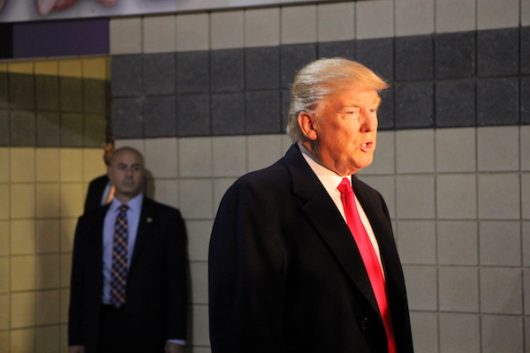
President-elect Donald Trump addresses the media at The Schottenstein Center on Dec. 8. Credit: Nick Roll | Campus Editor
Thursday afternoon, President-elect Donald Trump met privately at the Schottenstein Center with victims of the Nov. 28 attack on campus that left about a dozen in the hospital, as well as their families and the first responders. It was not clear how many victims were present. At least one, professor emeritus William Clark, told The Columbus Dispatch that he would not be attending.
The attack was carried out with a knife and car by Abdul Razak Ali Artan, a third-year in logistics management. Artan was shot and killed by a University Police officer who responded to the incident.
Trump said it was an honor to be in Ohio and meet with the victims and first responders. He did not take questions from the media following his brief statement. University President Michael Drake met briefly with Trump in a separate meeting, and Drake also met with the victims separately, said Ohio State spokesman Chris Davey. University Police Chief Craig Stone was present at the meeting between Trump and the victims’ families.
“It’s an honor to be here,” Trump said. “These were really brave people, amazing people. The police and first responders did an incredible job. One young gentleman was incredible, I got to meet him. The families have done so well, to come through this so well.”
Protesters were present outside the Schott before the visit, where they chanted and held signs in opposition to Trump and his coming to OSU, as well as the openly carrying protesters who marched through campus on Monday.
“He was supposed to come today to address victims of the attack, and while that’s a noble act of him to do, I don’t believe that he is concerned about issues that act of the root of these sorts of problems,” said Megan Fuerst, a fourth-year in environment, economy, development and sustainability.
Fuerst listed mental health and “sensible gun reform” as issues that need to be addressed to stop violent attacks on college campuses and schools.
She also accused Trump of running a campaign based on “hate and xenophobia,” pointing to a post he made on Twitter following the attack saying Artan should not have been allowed into the U.S.
“I would never condone acts of violence, and it’s totally wrong, what (Artan) did, but the fact that (Trump) said he shouldn’t be here based off his ethnicity is completely wrong,” Fuerst said. “Not one individual from any group can represent a whole religion.”
The protesters dispersed at around 2:30 p.m., when they marched to a teach-in at University Hall focused on teaching in stressful times, such as the days and weeks following the attack.
Trump also offered condolences for John Glenn, a former astronaut and U.S. senator from Ohio who died on Thursday.
“To me, he was a great American hero,” Trump said. “I met him on two separate occasions, liked him, always liked him. He was indeed an American hero.”
Clarification, 12/9: A quote referring to Artan as a “legal citizen” was removed from an earlier version of this story. As a refugee, he was a legal resident, though there is no indication he became a citizen.


